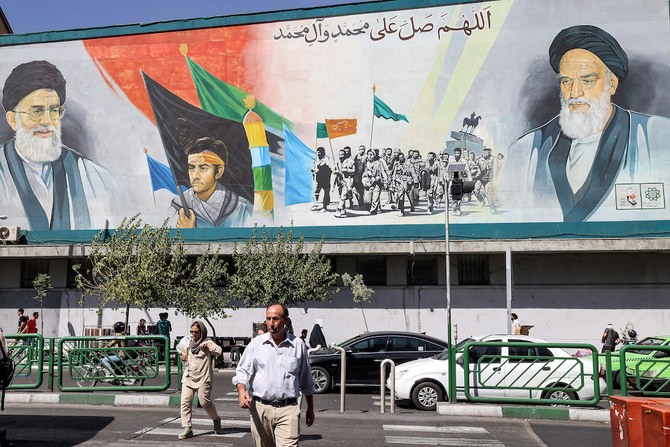
- ARAB NEWS
- 11 Jul 2025

A new $2 billion graft case has surfaced in Iran related to tea imports. The current Iranian government introduces itself as the one that exposed this case — rather than being the cause of it — perhaps hinting that the former reformist government is the one to blame. Indeed, the tea imports graft case is just one in a long list of corrupt financial transactions worth billions of dollars to have been conducted over the decades of the Islamic Republic’s tenure.
For example, there were graft cases reported during the reign of the former hard-line, populist President Mahmoud Ahmadinejad involving commissions worth billions of dollars that went to businessman Babak Zanjani. This is in addition to the Padideh Shandiz real estate corruption case and the growing Islamic Revolutionary Guard Corps involvement in customs and trade duty evasion, to the point that Ahmadinejad described them as “smuggler brothers” amid their control over sensitive ports and airports in the country.
And then there was the astronomical salaries case reported during the reign of Hassan Rouhani, among many other cases. All these cases have negatively impacted the private business environment and investments in Iran, thus leading the country to incur massive economic losses.
As regards the recent tea imports graft case, the Debsh Tea company imports tea from abroad, hence involving itself in the $2 billion fraud. The company was involved in currency misuse, receiving foreign currency from the government at prices lower than the black market. Instead of allocating these subsidized dollars for the import of Indian tea — scarce on the local market — the company sold a big portion of them on the black market, thereby reaping huge benefits, while importing low-quality Kenyan tea with the rest of the money.
The company has reportedly been involved in these transactions since 2018. The total currency the company obtained between 2019 and 2022 was $2.37 billion. In addition to monopolizing this important product — which is one of the most popular items, along with coffee, that is responsible for boosting the mood of the Iranian people — the company has obtained nearly 80 percent of the subsidized currency allocated for tea imports in Iran. According to Iranian newspaper reports, the company’s allocations over the past two years are equivalent to those allocated to the imports of medicine and baby formula. This has raised questions about the identity of the backers and beneficiaries.
Officials close to the government of former President Rouhani have raised questions as to why 80 percent of imported tea subsidies have been allocated to this company in particular, preferring it over dozens of others working in the same field. Pedram Soltani, a former member of the Iranian Chamber of Commerce, told Radio Farda: “Such a huge sum of money cannot be allocated without widespread coordination and collaboration, special permits, approval from high-ranking officials, a large complicit network for facilitating the sale of the currencies on the free market.” These remarks are indicative of the fact that the case is bigger than merely importing tea from abroad.
Corruption has had massive costs for the economy and for the living conditions of the Iranian people
Dr. Mohammed Al-Sulami
It is clear that financial corruption has had massive costs for the economy and for the living conditions of the Iranian people over the past few decades. These costs include the flight of foreign investment, local investment and capital, a lack of free competition, an inclination to liquidate productive assets and a preference for swift profits and speculation over investment and production. Over recent years, there has been a surge in capital flight from the Iranian market, with investments being redirected to neighboring states and the real estate sector in Turkiye.
It is no surprise that foreign direct investment in Iran fell to $1.5 billion in 2022 compared to $5 billion in 2017, according to the UN Conference on Trade and Development. Even the 2017 figure — which came after the signing of the 2015 nuclear deal — was remarkably low, accounting for only 0.5 percent of the overall foreign investment flows between countries. It is also worth noting that a single sector such as oil needs investments of $2 billion, let alone the other sectors damaged due to the sanctions imposed on Iran since 2018, such as the automobile, civil aviation and agriculture sectors.
Financial corruption deprives the state treasury and development allocations in Iran of massive funds, whether in customs, taxes or subsidy allocations. This is in addition to concentrating wealth in the hands of a small clique of people who are privileged and close to the circles of power. The majority of the people, meanwhile, are compelled to pay bribes to have their very basic interests and needs met.
Mehdi Nasiri, the former editor-in-chief of Kayhan newspaper, pointed the finger of blame at “supreme entities” in relation to the recent tea imports corruption case. On his Telegram channel, he said: “The recent massive corruption case related to the tea imports wouldn’t have occurred without the huge intervention, pressure and influence, be it direct or indirect, by the intelligence and judicial institutions — either appointed by or affiliated with the supreme leadership, which possesses all the powers in this institution.”
What makes this perception likely is the report released by Transparency International earlier this year. In it, Iran occupied a low ranking on the Corruption Perceptions Index, placing 147th out of 180, just ahead of Afghanistan but lower than Uganda. Two decades ago, the country’s ranking was much better, with it occupying 78th place.
It is worth noting that moving ahead with the majority of investments and major projects hinges on the IRGC and its massive economic conglomerates, which operate in sectors such as oil, gas, petrochemicals, automobiles, contracting, foreign trade and mining. This places a genuine impediment on the development of the private sector in Iran and the free operation of foreign investors in case sanctions are lifted in the future.